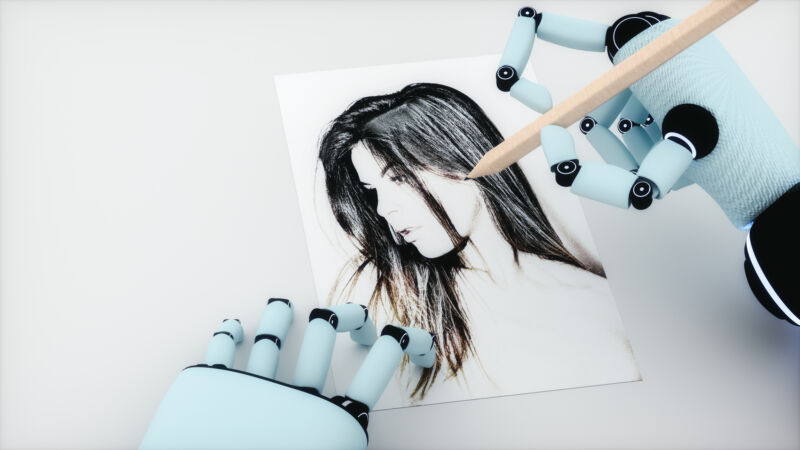Back to the drawing board —
Artists prepare to take on AI image generators as copyright suit proceeds

Artists defending a class-action lawsuit are claiming a major win this week in their fight to stop the most sophisticated AI image generators from copying billions of artworks to train AI models and replicate their styles without compensating artists.
In an order on Monday, US district judge William Orrick denied key parts of motions to dismiss from Stability AI, Midjourney, Runway AI, and DeviantArt. The court will now allow artists to proceed with discovery on claims that AI image generators relying on Stable Diffusion violate both the Copyright Act and the Lanham Act, which protects artists from commercial misuse of their names and unique styles.
"We won BIG," an artist plaintiff, Karla Ortiz, wrote on X (formerly Twitter), celebrating the order. "Not only do we proceed on our copyright claims," but "this order also means companies who utilize" Stable Diffusion models and LAION-like datasets that scrape artists' works for AI training without permission "could now be liable for copyright infringement violations, amongst other violations."
Lawyers for the artists, Joseph Saveri and Matthew Butterick, told Ars that artists suing "consider the Court's order a significant step forward for the case," as "the Court allowed Plaintiffs' core copyright-infringement claims against all four defendants to proceed."
Stability AI was the only company that responded to Ars' request to comment, but it declined to comment.
Artists prepare to defend their livelihoods from AI
To get to this stage of the suit, artists had to amend their complaint to better explain exactly how AI image generators work to allegedly train on artists' images and copy artists' styles.
For example, they were told that if they "contend Stable Diffusion contains 'compressed copies' of the Training Images, they need to define 'compressed copies' and explain plausible facts in support. And if plaintiffs’ compressed copies theory is based on a contention that Stable Diffusion contains mathematical or statistical methods that can be carried out through algorithms or instructions in order to reconstruct the Training Images in whole or in part to create the new Output Images, they need to clarify that and provide plausible facts in support," Orrick wrote.
To keep their fight alive, the artists pored through academic articles to support their arguments that "Stable Diffusion is built to a significant extent on copyrighted works and that the way the product operates necessarily invokes copies or protected elements of those works." Orrick agreed that their amended complaint made plausible inferences that "at this juncture" is enough to support claims "that Stable Diffusion by operation by end users creates copyright infringement and was created to facilitate that infringement by design."
"Specifically, the Court found Plaintiffs' theory that image-diffusion models like Stable Diffusion contain compressed copies of their datasets to be plausible," Saveri and Butterick's statement to Ars said. "The Court also found it plausible that training, distributing, and copying such models constitute acts of copyright infringement."
Not all of the artists' claims survived, with Orrick granting motions to dismiss claims alleging that AI companies removed content management information from artworks in violation of the Digital Millennium Copyright Act (DMCA). Because artists failed to show evidence of defendants altering or stripping this information, they must permanently drop the DMCA claims.
Part of Orrick's decision on the DMCA claims, however, indicates that the legal basis for dismissal is "unsettled," with Orrick simply agreeing with Stability AI's unsettled argument that "because the output images are admittedly not identical to the Training Images, there can be no liability for any removal of CMI that occurred during the training process."
Ortiz wrote on X that she respectfully disagreed with that part of the decision but expressed enthusiasm that the court allowed artists to proceed with false endorsement claims, alleging that Midjourney violated the Lanham Act.
Five artists successfully argued that because "their names appeared on the list of 4,700 artists posted by Midjourney’s CEO on Discord" and that list was used to promote "the various styles of artistic works its AI product could produce," this plausibly created confusion over whether those artists had endorsed Midjourney.
"Whether or not a reasonably prudent consumer would be confused or misled by the Names List and showcase to conclude that the included artists were endorsing the Midjourney product can be tested at summary judgment," Orrick wrote. "Discovery may show that it is or that is it not."
While Orrick agreed with Midjourney that "plaintiffs have no protection over 'simple, cartoony drawings' or 'gritty fantasy paintings,'" artists were able to advance a "trade dress" claim under the Lanham Act, too. This is because Midjourney allegedly "allows users to create works capturing the 'trade dress of each of the Midjourney Named Plaintiffs [that] is inherently distinctive in look and feel as used in connection with their artwork and art products.'"
As discovery proceeds in the case, artists will also have an opportunity to amend dismissed claims of unjust enrichment. According to Orrick, their next amended complaint will be their last chance to prove that AI companies have "deprived plaintiffs 'the benefit of the value of their works.'"
Saveri and Butterick confirmed that "though the Court dismissed certain supplementary claims, Plaintiffs' central claims will now proceed to discovery and trial." On X, Ortiz suggested that the artists' case is "now potentially one of THE biggest copyright infringement and trade dress cases ever!"
"Looking forward to the next stage of our fight!" Ortiz wrote.